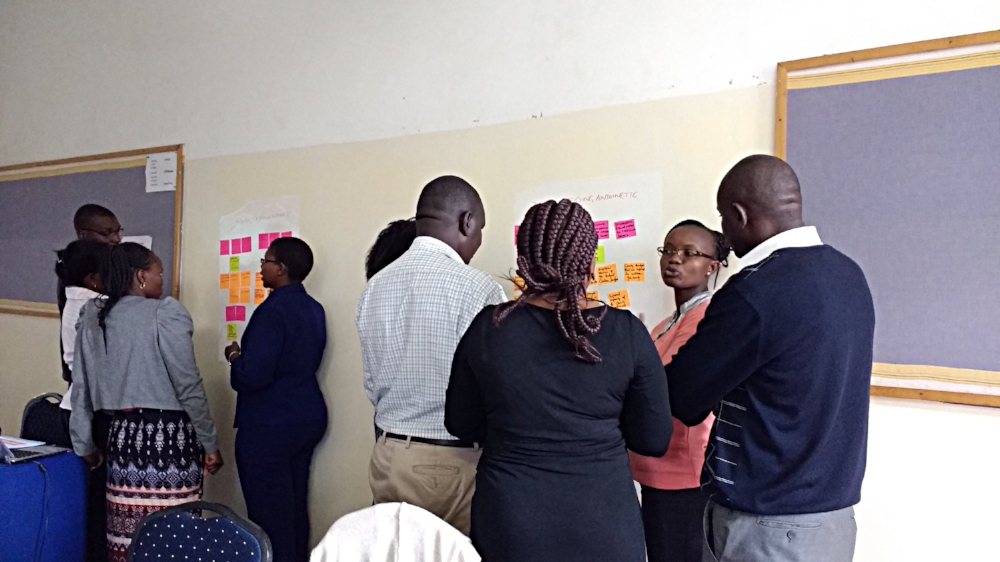
This piece originally appeared on the Panopoly Digital Blog.
Last week, I was in Nairobi, Kenya with the Center for International Private Enterprise (CIPE) and their Kenyan partners from a wide variety of organisations, including civil society organisations and business membership associations from across Kenya. I was delivering a two-day training workshop on monitoring, evaluation and communication, how to use technology for those M&E and advocacy activities, and how to think about digital security.
CIPE strengthens democracy worldwide through private enterprise and market reforms. In Kenya, it works with partners to build policy and regulatory reform and provide services to regional members. Since Kenya’s devolution and decentralisation of government launched in 2013, CIPE’s Kenya partners have been working with their audience at a local level to ensure that local governments are accountable to their citizens.
The 17 workshop participants were particularly interested in getting citizens involved in local government processes, getting their opinions on issues that concern them, disseminating important information to them, gathering citizen-generated data and opinions, and giving citizens a voice. Clearly, there is a big role for technology to play, and the training included polling tools for SMS such as TextIt to gather and disseminate information, data collection with survey tools such as Google Forms or SurveyMonkey, building communication and social media strategies using Twitter and Facebook, and making using backend Twitter and Facebook analytics as another form of M&E. We also covered digital security and privacy, and looked at using secure encrypted messaging tools such as Signal, or encrypted email or cloud storage tools such as ProtonMail or SpiderOak.
I am a big believer in the importance of getting real, hands-on experience in using tools like this, and participants spent time building their own polls and surveys for their audience. I’m also a big believer in putting yourself in the shoes of the user – and we were reminded of the reality of what digital access and use (and barriers to that access and use) really means for many of CIPE’s audience members across Kenya several times during the workshop, when the internet cut out for extended periods of time, making it difficult to use some of these tools.
Although Kenya, as the land of m-Pesa, is often seen as a tech paradise and a fertile test bed for digital innovation, not everyone has equal access and opportunities to use technology and ICT statistics for Kenya are somewhat surprising. While 92% of the population has access to a mobile phone, only 44% have a smartphone, and only 14% are active social media usICICTers, with women having less access to internet than men. For participants, it was a reminder that in more rural areas or for low-income groups, access to a mobile phone or even access to reliable internet and mobile networks is not automatic. This point was hammered home even more when mobile operator Safaricom’s networks also went down nationwide for almost a whole day, and millions of people found themselves unexpectedly digitally excluded – meaning that not only could people not make calls, send SMS or use data, but they also couldn’t use m-Pesa, a big issue in Kenya where paying for things through m-Pesa is becoming more common than cash. Kenyan Twitter was alight with users complaining that they hadn’t been able to pay for any food or goods all day because they rarely carry cash anymore.
For me, Kenya’s ICT stats and the Safaricom situation are good examples of the juxtaposition of digital access and use in Kenya. On the one hand, more sophisticated services like m-Pesa are omnipresent, starting to replace cash, and Kenya leads East Africa, if not all of Africa, in innovation. But on the other hand, internet penetration growth was 0% in 2016, and 66% of the adult population don’t have a smartphone. One of the outcomes of the CIPE workshop was participants realising this, and making plans to first understand their audience’s digital landscape and then design their technology use accordingly.
The workshop in Kenya is one of several Panoply Digital is doing globally around M&E and technology, as CIPE’s training partner – Michael was in Nepal in February, I was in Argentina last month, and in the next few months, Lauren will be in Jordan and I will be in Serbia. Stay tuned!
Alexandra Tyers is a mobile for development specialist at Panopoly Digital.
Published Date: May 11, 2017
